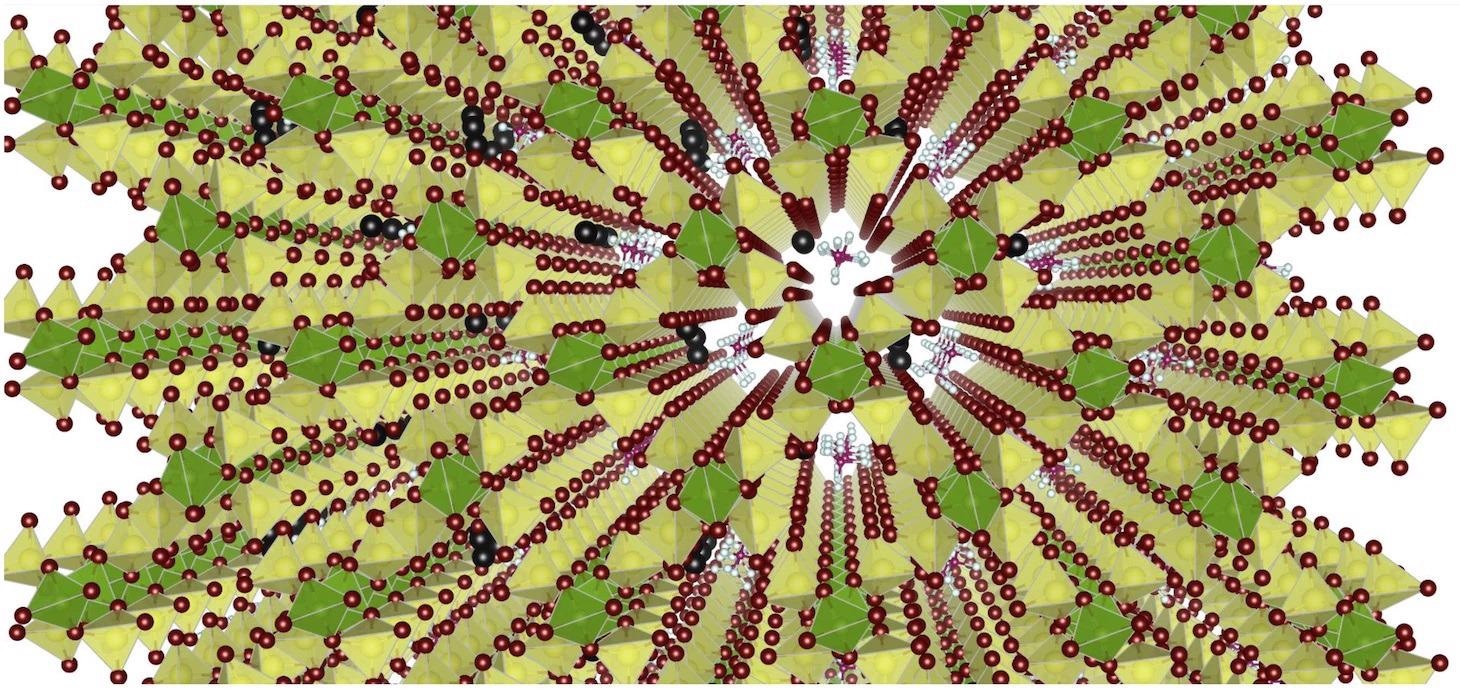A Cooperative Research and Development Agreement (CRADA) has been signed by SAFCell Inc. with the Department of the Navy’s US Naval Research Laboratory (NRL).
 Borosulfates are a unique class of compounds that are formed when, under special conditions, borates and sulfates are “forced” to form new bonds and lose water in the process of making polymeric anionic chains. Borosulfates are a part the “solid acid” class of compounds that have been leveraged to develop Solid Acid Fuel Cells (SAFCs) by SAFCeII, Inc., but are different in that the anions in borosulfates are bound together, producing a combination of attractive new properties. NRL has found that borosulfates that specifically exhibit one-dimentional anionic chains (as seen in the accompanying figure) have very special properties that produce a very low barrier to proton transport within the crystal in combination with relatively high thermal stability and good tolerance for both wet and dry conditions at target fuel cell operating temperature. This makes one-dimensional borosulfates, such as ammonium borosulfate, an attractive alternative to current state-0f-the-art solid acid electrolytes. Image Credit: US Naval Research Laboratory.
Borosulfates are a unique class of compounds that are formed when, under special conditions, borates and sulfates are “forced” to form new bonds and lose water in the process of making polymeric anionic chains. Borosulfates are a part the “solid acid” class of compounds that have been leveraged to develop Solid Acid Fuel Cells (SAFCs) by SAFCeII, Inc., but are different in that the anions in borosulfates are bound together, producing a combination of attractive new properties. NRL has found that borosulfates that specifically exhibit one-dimentional anionic chains (as seen in the accompanying figure) have very special properties that produce a very low barrier to proton transport within the crystal in combination with relatively high thermal stability and good tolerance for both wet and dry conditions at target fuel cell operating temperature. This makes one-dimensional borosulfates, such as ammonium borosulfate, an attractive alternative to current state-0f-the-art solid acid electrolytes. Image Credit: US Naval Research Laboratory.
CRADA is an agreement that is signed between a Federal laboratory and a non-Federal party to execute collaborative research and development in any area that is persistent with the Federal laboratory’s mission.
Under the terms and conditions and within the scope of the agreement, SAFCell will offer expertise and advice for the development and testing of a new class of borosulfate solid acid intermediate-temperature proton-conducting materials. Later on, they will assess such experimental electrolytes present in electrochemical cells.
NRL has developed borosulfate proton electrolytes, which are expected to have significant advantages over other existing proton electrolyte technologies used in various electrochemical energy conversion devices.
Holly Ricks-Laskoski PhD, Senior Partnership Manager, Technology Transfer Office, Naval Research Laboratory
Ricks-Laskoski added, “This collaboration is expected to further develop fuel cells based upon NRL’s borosulfate technology to provide stable, compact, and robust sources of electrical power.”
NRL’s office is responsible for this CRADA.
Compared to other classes, considerable benefits have been provided by the intermediate-temperature proton-conducting materials. Working at mid-range temperatures of nearly 250 °C (482 °F), SAFCell’s stacks tend to endure impurities that pose hindrances to other fuel cell technologies, while still making use of affordable flexible polymer seals and metal components.
This special combination of properties leads to an affordable and rough stack platform that functions easily on fuels that are commercially available.
SAFCell is excited to work with NRL to develop electrochemical devices using NRL's borosulfate electrolytes. These solid state proton conductors can operate at higher temperatures and without the hydration requirements of our current electrolytes, which equates to more versatile and lower cost solid acid systems.
Calum Chisholm, Chief Executive Officer, SAFCell
Chisholm, further stated, SAFCell will, “Apply their decades of experience working with solid acid electrolytes to accelerate the development of this new class of proton conductors into solid state fuel cells, hydrogen generators, and membrane reactors.”
NRL partners with an extensive range of organizations such as industry, academia and other government organizations to expedite the development and transition of new and innovative technologies for the warfighter.
For those companies who wish to work with NRL, Ricks-Laskoski, stated, “NRL is open and we are looking forward to working with you.”